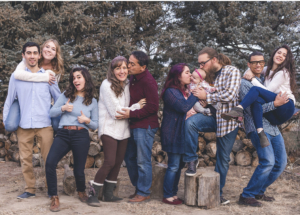What About Your Relatives?

In the New Testament, we find new believers confronting their own family first with the gospel. One writer calls this “oikos evangelism.” The word “oikos” means “household” in the language of the New Testament.
A model for reaching our families is found in the first encounter Andrew had with Jesus. Read what it motivated him to do:
“He found first his own brother Simon [Peter], and said to him, ‘We have found the Messiah’ (which translated means Christ). He brought him to Jesus” (John 1:42-42a).
It begins right at home.
What are you doing to introduce Christ to your immediate family? There are many ways to do this. For one, having times of family Bible reading and prayer has a great history in evangelism. When children are young, reading the historical sections can be most easily digested by their immature minds. Reading the lives of great Christians and evangelistic books can also be helpful.
It goes without saying that we should plant our family in a true church where the Bible is believed and where the gospel of free grace is presented clearly. Carefully chosen camps and youth activities may also help. One way to help your children know Christ is to ask them to conduct interviews with godly men and women you respect, finding out all they can about how they came to Christ and how life has gone for them.
What about the extended family?
Some friends of mine have made a long list of all their relatives. They carefully wrote out their testimony and an introductory letter (with a personalized note) and slipped it into a book we provided that explains the gospel. This was sent to parents, brothers and sisters, cousins, nieces and nephews. The resulting conversations and changes have been remarkable.
Some of you have relatives that may soon die. Do you really want to let them slip into hell without a clear explanation of the gospel? Aren’t you the one to do that?
A friend’s father was old, blind, and grumbling about life. He sent some literature to his brother and asked him to begin reading it to their father in the retirement home. Much to their surprise the man was converted and has become an excited believer, though he is over 90 years old!
Admittedly, some relatives are difficult to talk to. But that should not keep us from trying. One way to deal with such strong “resisters” is to be more forthcoming about arranging a time to talk it out. Instead of waiting for the opportune moment, just state, “Dad (or whoever it is), you know that I am concerned about you having a true relationship with Christ. I need to talk straight with you about it at least once. Let’s plan for this and have nothing to distract us. How about this week on Tuesday night?”
It should be noted that sometimes people resist because they are under conviction about their need for Christ. Avoiding discussion is their only way to keep it at a comfortable distance. God can reach anyone if He wishes, even the person who seems the most incorrigible. Take literature with you and sincerely ask them to read it and talk with you about it. You may also tell them, if appropriate, that you wish to have this conversation about knowing Christ even if they are not interested. You are asking them to listen, even if it is only out of respect for you.
Although conversion is a sovereign act of God, He uses people to sow the seed. Until you try, you do not know what will happen. And you do not know what the gospel seed may do later if it is sown in their lives now. Don’t expect that you will have all the answers for them, or that you will do a great job at speaking the truth. You will likely fumble about a bit. But God has always condescended to our imperfections when doing His work through us.

